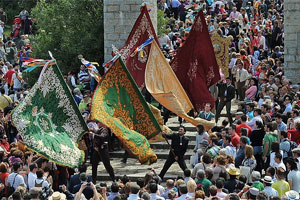Elche Medieval Festival

During the last week of October, the city of Elche is transformed into a great medieval market, in an atmosphere full of music, light and colour. Travel back in time and come and enjoy this great celebration: the Medieval Festival of Elche.
What does the Elche Medieval Festival consist of?
The city of Elche, in Alicante, is transformed into a huge medieval market during the last week of October. It is the popular festival known as the Elche Medieval Festival, organised by Elche City Council.

Since 1990 this city has been going back in time, turning itself into a medieval village from the Middle Ages: streets, squares, cloisters, chapels and theatres. There are great musical and theatrical performances, as well as exhibitions and other fantastic activities that form part of the programme for this festival.
How is the Elche Medieval Festival held?
The main slogans of this popular festival are joy and fun, accompanied by fireworks and many cultural activities:
- Medieval market.
- Musical performances, with the participation of local musical groups.
- Medieval jazz concerts.
- Classical plays.
- International conferences and congresses.
- Games for children.
- Parades.
- Contemporary and medieval dance.
- Exhibitions.
- Origins of the Elche Festival
This festival has been held since 1990, in the last week of October. It remained biennial until 2002, coinciding with the autumn performances of the Fiesta. Since 2003, the Medieval Festival has been held annually, and its scope has been extended to the Golden Age.
What else can you see in Elche?
It is worth visiting these places and buildings that symbolise the history and culture of the city of Elche:
- Basilica of Santa María: it used to be a mosque, on top of which a Catholic temple was built, in Gothic style and with a cross plan, which survived until 1492.
- Centre of Traditional Culture School Museum of Pusol: it is part of the Register of Exemplary Practices of the Committee for the Safeguarding of the Intangible Heritage of Unesco, since 2009. It exhibits more than 90,000 objects from the 19th and early 20th centuries.
- Moli del Real: a flour mill dating from the 18th century, although probably of Islamic origin. It is one of the identifying buildings of the Municipal Park and the city. It is home to the Fine Arts Association of Elche.
- Altamira Palace: this is one of the oldest and best preserved fortresses in the province of Alicante. It was the residence of the lords of Elche during the 15th and 19th centuries, housing great monarchs and the Catholic Monarchs.
- Historic Palm Grove of Elche: it is a unique cultural landscape with more than 200,000 palm trees, with the "white palm", a relic of the ancient Mediterranean palm tree culture, standing out. It has been declared a World Heritage Site.
- Proyecto Víbora II: is a great hiking or walking route located around the Vinalopó river. It has an urban art gallery.
Gastronomy in Elche
We invite you to enjoy some typical dishes of the traditional gastronomy of Elche:
- Rice with Rabbit and Snails: prepared with rabbit, snails, saffron, tomato and green pepper.
- Arroz con Costra: made with chicken, rabbit, red and white sausage, eggs and saffron.
- Bollitori: made with fresh cod, pumpkin, potatoes, artichokes, green beans, dried peppers and hard-boiled eggs.
- Pan de Higo: made with dried figs.
- Puchero con Pelotas: prepared with turnips, parsnips, potatoes, chickpeas, pig's trotters, chicken and hen's legs, veal shank, bacon and pork.
- Tabellacos: dish made with artichokes, desalted and crumbled cod, potatoes, tomatoes, broad beans, peas and eggs.
- Tortada de Elche: typical dessert made with almond flour and flour, with Swiss or Italian meringue.
Share images, videos and interesting information about the Elche Medieval Festival on social networks. Use the hashtags #Elche #FestivalMedievalElx #festivalmedievalelche




